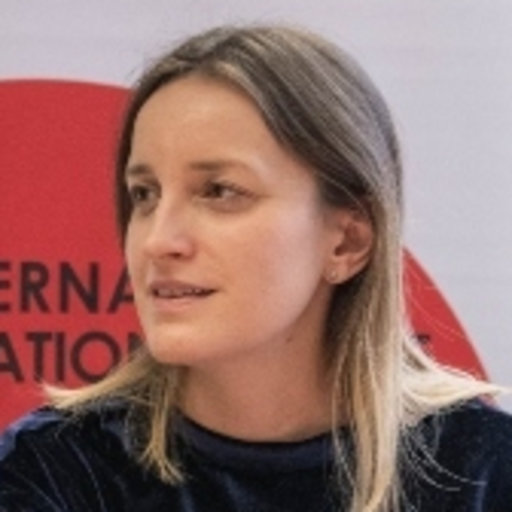Staff Exchange
Staff Exchange
 Staff exchange programs provide an opportunity for professors and teachers to spend a certain period at partner universities, where they can exchange their knowledge and experiences with colleagues from other educational systems. Staff exchange contributes to establishing new and strengthening existing connections with research institutions worldwide. Successfully implemented exchange programs impact the improvement of education quality and university community reforms.
Staff exchange programs provide an opportunity for professors and teachers to spend a certain period at partner universities, where they can exchange their knowledge and experiences with colleagues from other educational systems. Staff exchange contributes to establishing new and strengthening existing connections with research institutions worldwide. Successfully implemented exchange programs impact the improvement of education quality and university community reforms.
Faculty staff can utilize various exchange programs. The program offering the most opportunities for exchange is Erasmus+ (KA107) – International Credit Mobility. Several successfully implemented exchanges of academic staff demonstrate the Faculty’s significant benefits from faculty members applying to these programs in the future. Similar to student exchange programs, applications for staff mobility programs within the Erasmus+ (KA107) program are made based on open calls at the faculty level or based on calls at the university level.
Academic staff can also utilize other exchange programs, such as the Central European Exchange Programme for University Studies (CEEPUS) network, the FULBRIGHT program, and others.
 International projects, whether scientific research projects or exchange projects, play a key role in expanding knowledge and fostering the exchange of ideas worldwide. Scientific research projects allow researchers to share their knowledge and resources, resulting in advances in science and research. Exchange projects, on the other hand, offer students and professionals the opportunity to acquire new skills, enrich their cultural experiences, and build an international network of collaboration. This type of collaboration not only promotes the transnational transfer of knowledge but also builds bridges between science and culture.
International projects, whether scientific research projects or exchange projects, play a key role in expanding knowledge and fostering the exchange of ideas worldwide. Scientific research projects allow researchers to share their knowledge and resources, resulting in advances in science and research. Exchange projects, on the other hand, offer students and professionals the opportunity to acquire new skills, enrich their cultural experiences, and build an international network of collaboration. This type of collaboration not only promotes the transnational transfer of knowledge but also builds bridges between science and culture. Student mobility represents a crucial component of the modern education system, offering students a unique opportunity to gain valuable experiences beyond their home institution. Student mobility encourages diversity, enhances language skills, fosters mutual understanding, and promotes interculturality. Additionally, internships and practical training abroad provide students with the chance to apply their theoretical knowledge in the real world, acquiring practical skills and expanding their professional network.
Student mobility represents a crucial component of the modern education system, offering students a unique opportunity to gain valuable experiences beyond their home institution. Student mobility encourages diversity, enhances language skills, fosters mutual understanding, and promotes interculturality. Additionally, internships and practical training abroad provide students with the chance to apply their theoretical knowledge in the real world, acquiring practical skills and expanding their professional network. International cooperation plays a crucial role in enhancing the global academic and scientific community. This collaboration, particularly with partners from the European Union and around the world, brings a range of significant benefits to our Faculty, enriching areas of research, education, and innovation.
International cooperation plays a crucial role in enhancing the global academic and scientific community. This collaboration, particularly with partners from the European Union and around the world, brings a range of significant benefits to our Faculty, enriching areas of research, education, and innovation.



 International cooperation represents the fundamental pillar of development and improvement of the Faculty of Science. In the era of globalization, the Faculty of Science recognizes the crucial role of internationalization in ensuring high-quality education and research. Our commitment to international cooperation stems from the belief that diversity and exchange of ideas are key drivers for academic advancement.
International cooperation represents the fundamental pillar of development and improvement of the Faculty of Science. In the era of globalization, the Faculty of Science recognizes the crucial role of internationalization in ensuring high-quality education and research. Our commitment to international cooperation stems from the belief that diversity and exchange of ideas are key drivers for academic advancement. Professional practice at the FNSM is an ideal opportunity to apply your theoretical knowledge in a real working environment. Through this form of training, you will gain deep experience in your field of study, develop practical skills, and establish contacts with professionals in your field.
Professional practice at the FNSM is an ideal opportunity to apply your theoretical knowledge in a real working environment. Through this form of training, you will gain deep experience in your field of study, develop practical skills, and establish contacts with professionals in your field. If you are studying to become a teacher, it is necessary for you as a student to spend some time in primary or secondary schools. This experience is invaluable as it provides you with a practical insight into the teaching process and allows you to apply theoretical knowledge in a real-world setting. Working in the classroom helps you develop pedagogical skills, refine teaching methods, and gain a better understanding of the needs and challenges teachers face daily. Moreover, direct contact with students enables you to enhance communication skills with students, develop the ability to adapt to different learning styles, and explore the diversity of educational needs within the school community.
If you are studying to become a teacher, it is necessary for you as a student to spend some time in primary or secondary schools. This experience is invaluable as it provides you with a practical insight into the teaching process and allows you to apply theoretical knowledge in a real-world setting. Working in the classroom helps you develop pedagogical skills, refine teaching methods, and gain a better understanding of the needs and challenges teachers face daily. Moreover, direct contact with students enables you to enhance communication skills with students, develop the ability to adapt to different learning styles, and explore the diversity of educational needs within the school community. Field work at the FNSm represent an exciting part of the educational process where you will have the opportunity to apply your theoretical knowledge in concrete field research. This activity provides you with practical experience in collecting and analyzing field data while also developing your research and methodological skills. Field work contribute to expanding holistic understanding of subjects and encourage students to creatively apply acquired competencies in solving real problems in the field of natural sciences.
Field work at the FNSm represent an exciting part of the educational process where you will have the opportunity to apply your theoretical knowledge in concrete field research. This activity provides you with practical experience in collecting and analyzing field data while also developing your research and methodological skills. Field work contribute to expanding holistic understanding of subjects and encourage students to creatively apply acquired competencies in solving real problems in the field of natural sciences.